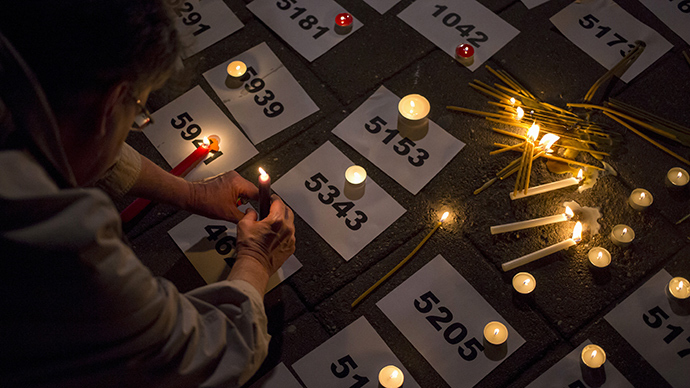All Srebrenica massacre culprits must be punished – Moscow

Everyone responsible for the mass murder of thousands Muslims near Srebrenica during the Bosnian war in 1995 must be brought to justice and punished as soon as possible, the Russian Foreign ministry said on the eve of the 20th anniversary of the tragedy.
“We strongly call for all individuals involved in these and other atrocities in Bosnia and Herzegovina to be brought to justice and be deservedly punished as soon as possible. We express our sincere condolences to the families of all innocent victims,” the ministry’s statement said.
As a guarantor of the 1995 Dayton Agreement, and Bosnia and Herzegovina’s active partner in promoting the Bosnian settlement, Moscow “will continue doing everything within its power to consistently strengthen inter-ethnic and inter-confessional peace in this country and elsewhere in the Balkans,” the ministry said.
“We are convinced that the establishment of mutual understanding among individuals and peoples is the best way to guarantee peace, stability and prosperity in the region,” it said.
On Wednesday, Russia vetoed the UK-backed UN Security Council resolution condemning the Srebrenica massacre as genocide committed by the Serbian army. China, Nigeria, Angola and Venezuela abstained from the vote, while the other 10 states voted in favor.
The Russian UN envoy Vitaly Churkin said the draft text was “not constructive, confrontational and politically motivated.”
In June, Russian Foreign Minister Sergey Lavrov said that the UNSC resolution is anti-Serbian in general and incorrectly interprets the events even from a legal perspective. According to Lavrov, it “provokes further inter-ethnic tensions in the Balkans rather than promoting reconciliation of all the peoples living there.”
Meanwhile, the US House of Representatives adopted its own resolution on Srebrenica describing the events as “aggression and ethnic cleansing perpetrated by Bosnian Serb forces.”
The hostilities in Bosnia and Herzegovina began in 1992 after the republic broke away from Yugoslavia because of a dispute on the future of state’s political structure between the Serbs, Croats and Bosnian-Muslims. The same year the town of Srebrenica was occupied by Bosnian Muslims – the 28th Division under the command of Naser Oric of the Army of BiH) – and used as a foothold for attacks on Serb-controlled territory.
READ MORE: Srebrenica Massacre: Cameron pledges £1.2mn to memorial fund
On May 6, 1993 a UN Security Council resolution declared the city a demilitarized zone and several hundred Dutch peacekeeping forces were stationed near it to allegedly protect the enclave. At the begging of July in the same year the Army of Republika Srpska (VRS) launched an offensive on Srebrenica and entered the city by July 11. The attack was led by General Ratko Mladic who is now on trial for genocide in the International Criminal Tribunal for the Former Yugoslavia(ICTY) in The Hague along with the President of the Republika Srpska in BiH Radovan Karadzic.
Bosnian Muslim and UN officials have accused the Serbs of murdering thousands of Muslim men and boys after the enclave's fall. During the subsequent years the ICTY characterized the event as genocide and charged 20 people, convicting 14 of involvement in the events and sentencing them to long-term imprisonment.
Russia has repeatedly criticized the work of the ICTY. In particular, in January 2012, Lavrov blamed the tribunal for carrying political bias and double standards with regards to cases in which the accused are Bosnian Serbs and Muslims.
The UN International Court of Justice in its ruling on February 27, 2007, referred to the tragedy as genocide, but found that Serbia has neither incited, committed, or conspired to commit genocide. The court however said Serbia failed to take all measures within its power to prevent it thus violating its obligations under the Convention on the Prevention and Punishment of the Crime of Genocide.
Characterizing the events of July 1995 in Srebrenica as genocide is entirely inappropriate, believes Nebojsa Malic, a survivor of the Bosnian War and RT journalist who has written extensively about the conflict.
“Actual facts point to several hundred executions of prisoners, which is a war crime nobody denies,” Malic said. “But genocide? While sparing the women, children and the elderly? Based on hearsay evidence from people who admitted to perjury?"
“Tens of thousands of Muslims in the Middle East and North Africa were killed in US 'humanitarian' wars since, conducted under the slogan of 'no more Srebrenicas'. Nobody in the West counted or mourned them. This isn’t about concern for the Muslim dead, but about justifying wars worldwide.”
In March 2010 the Serbian parliament adopted a declaration condemning the events in Srebrenica. The document recognizes that not everything possible was done to prevent the tragic events. In May 2013, Serbian President Tomislav Nikolic apologized for crimes against Bosnian Muslims, however refusing to acknowledge the Srebrenica events as genocide.












